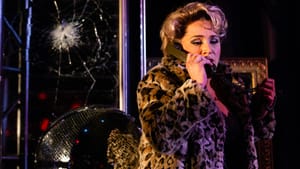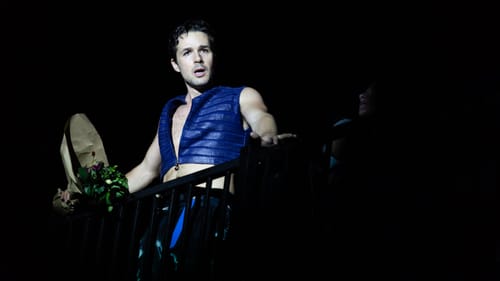Stay in the Loop
BSR publishes on a weekly schedule, with an email newsletter every Wednesday and Thursday morning. There’s no paywall, and subscribing is always free.
A majestic human voice
O18 Festival: Opera Philadelphia presents Francis Poulenc’s ‘Ne Quittez Pas’

Opera as an art form celebrates the human voice — rarely more so than in La voix humaine, Francis Poulenc’s 1959 monodrama for soprano and orchestra. Opera Philadelphia offers its first performances of the work as part of Ne Quittez Pas, an uneven evening of Poulenc music staged at Theatre of Living Arts.
Director James Darrah and scenic designer Tony Fanning have transformed the movie-theater-cum-concert-venue on South Street into a seedy 1970s French club, its walls festooned with fading posters and dusty liquor bottles. Pablo Santiago’s lighting vacillates between the expected cabaret din and aggressive strobes, suggesting the creeping influence of the discotheque. Much of the audience sits close to the stage at cabaret tables, drawn into the action by immediacy.
Out of the boudoir
From a logical standpoint, this setup makes little sense for Poulenc’s intimate domestic drama. Elle (sung here by soprano Patricia Racette) carries on a 45-minute, one-sided telephone conversation with her straying lover, imploring him to return. She drinks, smokes, and fiddles with a bottle of pills — the text refers to a past suicide attempt, and the suggestion of a future overdose hangs in the air. Most productions take place in Elle’s boudoir, an appropriately claustrophobic space that further evokes the specter of prior sexual fulfillment.
Darrah hints that Elle might be a performer — one of the set’s posters is of her at a microphone — but beyond that, Racette performs the work in a straightforward, restrained manner. I mean that in the best possible way. Her accomplished, idiomatic French serves Jean Cocteau’s text well, finding wit and pathos in unexpected places. At 53, her vocal prowess remains largely undiminished; she can still deliver a sonorous, easily produced high C.
Channeling Simone Signoret
Costumed in a leopard-print overcoat and slinky black slip by Chrisi Karvonides, with an excellent bouffant wig by David Zimmerman, Racette resembles many a French actress from the period of the opera’s creation (my companion and I both settled on Simone Signoret). But even more to the point, she conjures the tragic everywoman that gives the role its quotidian name. She manages a star performance through her remarkable subtlety and vocal grace.
The production doesn’t grapple with the potentially problematic elements of the piece — chiefly, the idea of a woman driven to hysterics and self-harm by losing the love of a man. Cocteau, who scripted the opera’s source text in the late 1920s, was by no means a proto-feminist, and elements can come across as mawkish and insensitive.

Yet in the hands of Racette and her gifted accompanist, Christopher Allen, I never came close to cringing. (The production uses a piano reduction in place of full orchestra, which Allen dispatches with real feeling for Poulenc’s melodious writing.) She treats Elle with respect, and the result is thrilling, majestically sung, and ultimately heartbreaking.
A tenuous connection
Had the evening begun and ended with this fine performance, I would have gone home happy. Alas, Darrah has affixed a self-devised curtain raiser that adds virtually nothing to the experience except an extra hour. Taking place in and around the cabaret stage and set in 1979 according to program notes, it features a devious brother/sister duo who kidnap, titillate, and torture a handsome stranger — all underscored by a series of Poulenc chants.
At least that’s what I think was going on. Perhaps it was the chardonnay going to my head, but the connection between Poulenc’s music, the various stitched-together texts (by Cocteau, Rilke, and Guillaume Apollinaire), and the lascivious trio remained abstract. The connection to La voix humaine seems even more tenuous.
The audience at least gets to hear the promising baritone Edward Nelson perform some of Poulenc’s most lovely art songs, which he dispatches with textual authority and warm vocal color. He does particularly well by Hôtel, the composer’s ever-arresting mélodie. The use of amplification, designed by Robert Kaplowitz, makes it hard to judge the actual size of Nelson’s voice, but it’s certainly one I wish to hear again.
As the scandalous siblings, Marc Bendavid and Mary Tuomanen are more Cocteau Twins than Cocteau.
The narrative frame represents an interesting, oddly executed idea. La voix humaine gives the audience a complete artist at the peak of her power. Hours later, Elle’s final cries continue ringing in my ears: Je t’aime, je t’aime.
What, When, Where
Ne Quittez Pas. Music by Francis Poulenc, James Darrah directed. Opera Philadelphia. Through September 30, 2018, at Theatre of Living Arts, 334 South Street, Philadelphia. (215) 732-8400 or operaphila.org.
Sign up for our newsletter
All of the week's new articles, all in one place. Sign up for the free weekly BSR newsletters, and don't miss a conversation.
 Cameron Kelsall
Cameron Kelsall